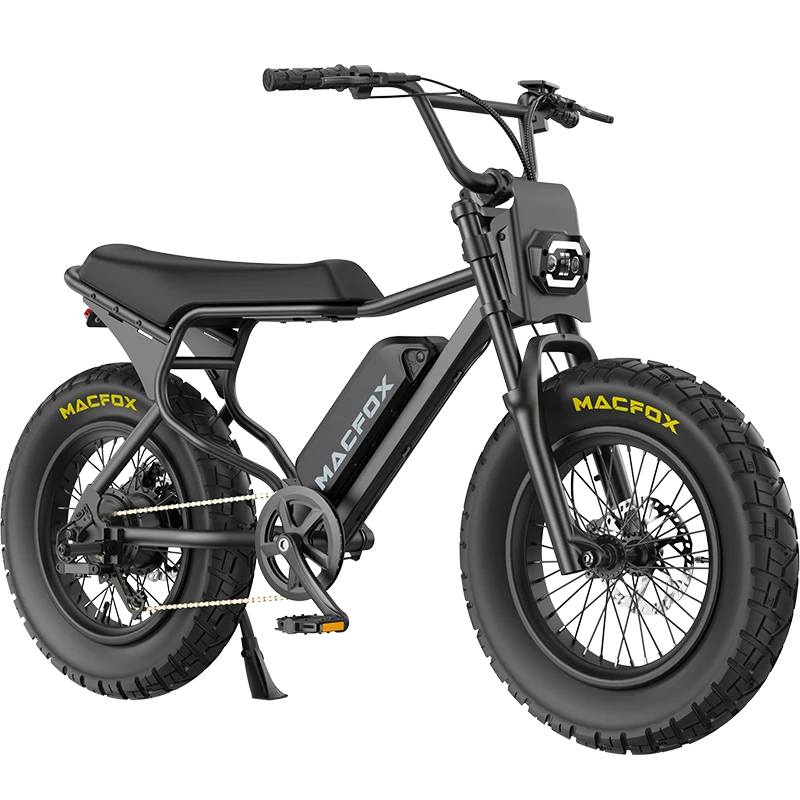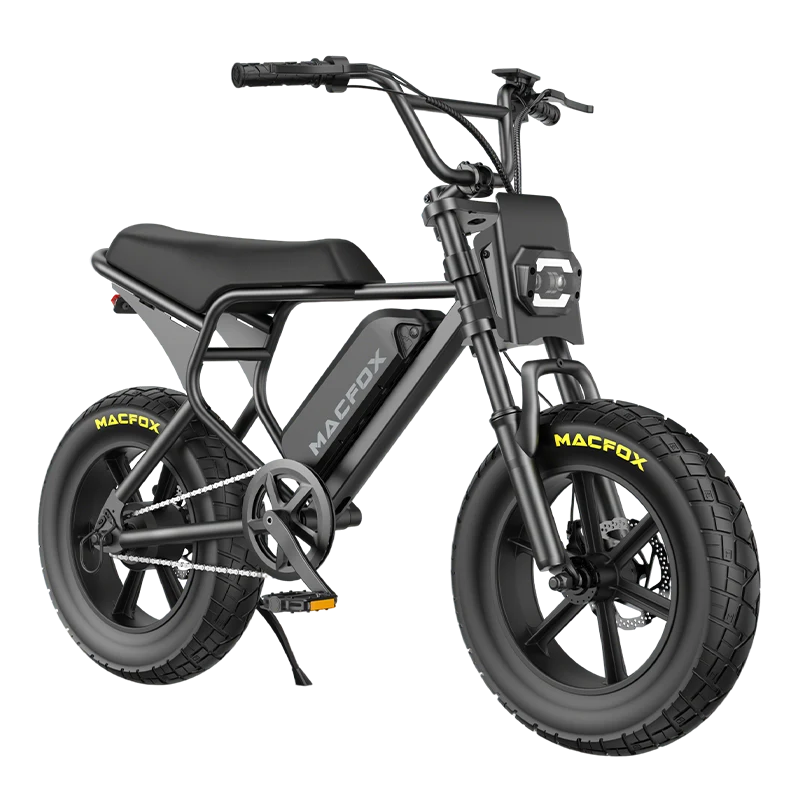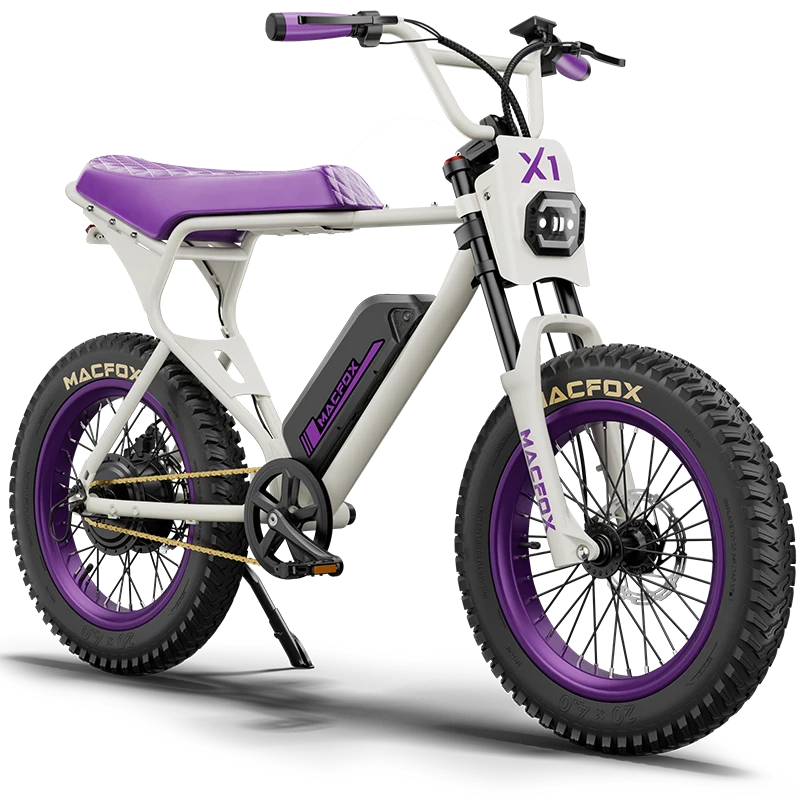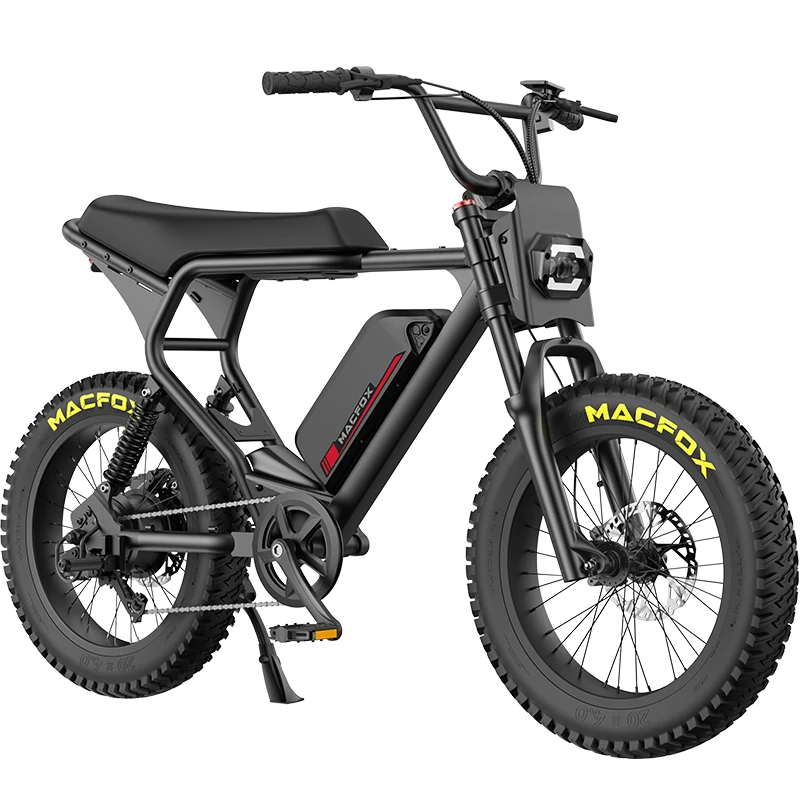Let’s face it. When you’re eyeing that fat tire electric bike, the big question on your mind is how much do fat tire electric bikes weigh?
It’s a question that might seem simple on the surface, but the answer is a bit more complicated than you think. The weight of these bikes can significantly impact your ride, your comfort, and—let's be honest—your ability to load it into your car. But, there’s a lot more to it than just numbers. Stick with me.
Average Weight of Fat Tire Electric Bikes
Here’s the deal. Fat tire e-bikes usually weigh somewhere between 60 to 80 pounds (27 to 36 kg). Now, this is heavier than a typical electric bike, which sits around 50 to 70 pounds (22 to 32 kg). But, that extra weight?
It’s not a bad thing—it’s a result of larger tires, a beefier frame, and more powerful motors. And trust me, that extra weight brings you some serious perks, especially if you’re riding off-road.
For example, the Macfox X1S commuter electric bike weighs 65 pounds.
Why Are Fat Tire E-Bikes Heavier Than Regular E-Bikes?
1. The Tires
Let’s talk tires. Fat tires are like the bodybuilders of the bike world—thicker, wider, and built to withstand a beating. They are typically 4 to 5 inches wide, while your standard e-bike tire measures just 1.75 to 2.5 inches.
They add a lot of weight—not just because of their size but because they’re made to grip rough terrain.
How much weight does that add? Fat tires can easily add 5 to 15 pounds (2 to 7 kg) to your bike’s overall weight. It depends on the type of tire, the material, and if you're rolling with tubes or a tubeless system.
That’s a noticeable bump in weight, but when you’re out on snow, sand, or rocky trails, those tires are the unsung heroes that keep you steady.
2. Suspension Systems
Suspension. You can’t ignore it. A smooth ride on rough trails? That’s the magic of suspension systems. Full suspension or front suspension—it all adds weight. The kind of suspension you have determines how much weight gets tacked on, and trust me, it’s not insignificant.
How much weight does suspension add?
- Front suspension? 3 to 7 pounds (1.4 to 3.2 kg).
- Full suspension? Up to 5 to 10 pounds (2.3 to 4.5 kg).
It may sound like a lot, but it’s a game-changer when you're cruising over bumpy paths. The trade-off? Totally worth it. No more bone-rattling rides.
3. The Frame Material
Now, let’s talk about the frame—the skeleton of your bike. It needs to support the weight of everything else, and fat tire e-bikes need a stronger frame to hold all that gear. The material matters. Some materials are light but strong, while others are heavier but more durable.
- Aluminum: Common, reliable, and lightweight. Frames made of aluminum usually add about 5 to 7 pounds (2.3 to 3.2 kg) to your bike.
- Steel: Heavier than aluminum but stronger. Steel can add 7 to 10 pounds (3.2 to 4.5 kg), and it’s perfect for durability if you're not too worried about the extra bulk.
- Carbon Fiber: The lightweight king. Carbon fiber frames weigh about 4 to 5 pounds (1.8 to 2.3 kg). But here’s the kicker—it’s expensive, and it’s fragile, so handle with care.
Read More: Electric Bike Frame Materials: Carbon, Aluminum, Steel, Titanium
4. Bigger Motor and Battery
Fat tire e-bikes pack a punch in the motor and battery department. Larger motors mean more power to get through those rough trails. Bigger batteries mean longer rides. But bigger means heavier.
- Motor: Fat tire bikes typically have motors that range from 500 to 1000 watts. A more powerful motor can easily add 5 to 10 pounds (2.3 to 4.5 kg) to your bike’s overall weight.
- Battery: A larger battery, required for longer trips, will add around 8 to 12 pounds (3.6 to 5.5 kg).
That’s a hefty addition, but remember—the more power, the better your ride over rough terrain. You’re not just getting a bike; you’re getting a beast ready for tough conditions.
How Does Fat Tire E-Bike Weight Compare to Other E-Bikes?
Let’s compare fat tire e-bikes to some other types of e-bikes so you can get a clearer picture:
- Standard E-Bikes: These weigh between 40 to 60 pounds (18 to 27 kg). Lighter, sure, but not built to crush tough trails.
- Mountain E-Bikes: These are usually in the 50 to 70 pounds (22 to 32 kg) range—kind of similar to fat tire bikes, but the suspension and tire differences make them more trail-specific.
- Folding E-Bikes: Typically 30 to 50 pounds (14 to 23 kg), but don’t expect them to hold up well on rugged terrain. They’re made for convenience, not adventure.
The bottom line? If you’re riding through sand dunes, snowy paths, or rough trails, the extra weight of a fat tire bike is totally justified. It’s built to give you better stability, comfort, and traction. Those lighter bikes just can’t handle the same abuse.
If you want to know how much an average electric bike weighs, you may want to take a look at this article:
Understanding the Weight of E-Bikes
Why Does the Weight Matter?
The weight of a fat tire e-bike doesn’t just affect how heavy it feels when you’re picking it up. It impacts your overall experience on the road, or off the road, in this case.
- Handling: Heavy bikes are harder to maneuver in tight spots. But here’s the trade-off—the extra weight gives you more stability on rough, uneven trails. It keeps you grounded, which can make all the difference when you're dealing with sand or snow.
- Comfort: Weight helps absorb the shock when you're riding over bumps. It makes the ride smoother, and frankly, more enjoyable.
- Transporting: The downside? Lifting that bike into your car or up a flight of stairs isn’t a walk in the park. But if you’re mostly riding, it’s less of a concern.
FAQs
Can I make my fat tire e-bike lighter?
Absolutely. You can swap out components like tires, suspension, and even the frame. Lighter alternatives exist, but they can be costly. Just remember, lighter components might sacrifice some durability.
Is there a “perfect” weight for a fat tire e-bike?
Not really. The right weight for you depends on what you need it for. If you're into long rides on smooth roads, you might prefer a lighter bike. But if you’re riding off-road or on tough terrain, the extra weight is a necessary evil that makes a better ride.
Are fat tire e-bikes too heavy for beginners?
If you’re new to biking, the weight may take some getting used to. But if you’re not carrying the bike around too much, it’s not a huge deal. Plus, the extra weight makes your ride more stable and comfortable on those rough trails.
Conclusion
Fat tire e-bikes weigh more than your typical electric bike, and there’s no getting around it. But that weight is part of what makes them perfect for tackling rough terrain like snow, mud, and sand. Sure, it adds some bulk, but it also gives you stability, comfort, and the ability to tackle any trail that comes your way. So, if you’re ready to take on the outdoors, don’t worry about the weight. Embrace it. It’s there to make your ride better.


















